- Home
- Lauren Willig
The Other Daughter
The Other Daughter Read online
Begin Reading
Table of Contents
About the Author
Copyright Page
Thank you for buying this
St. Martin’s Press ebook.
To receive special offers, bonus content,
and info on new releases and other great reads,
sign up for our newsletters.
Or visit us online at
us.macmillan.com/newslettersignup
For email updates on the author, click here.
The author and publisher have provided this e-book to you for your personal use only. You may not make this e-book publicly available in any way. Copyright infringement is against the law. If you believe the copy of this e-book you are reading infringes on the author’s copyright, please notify the publisher at: us.macmillanusa.com/piracy.
To my father, Kenneth C. H. Willig, for introducing me to history and story
ONE
“Can we go look, can we go look, can we go look?” Eight-year-old Amelie tugged at Rachel’s hand, pulling her toward the stairs.
“I don’t see what the point is of looking at a party you can’t go to,” said thirteen-year-old Albertine crossly.
“English, please,” said Rachel automatically.
The girls were meant to speak English when they were with her; the countess had been very clear about that. If it was a rule Rachel enforced somewhat selectively, that, she decided, was a matter for her own conscience.
Besides, she told herself virtuously, Albertine was meant to be speaking in English. If she refused to do so, then she would just have to be silent.
And thank heavens for that.
“The dresses are so jolie,” said ten-year-old Anne-Marie wistfully.
“English, please,” mimicked Albertine, in heavily accented English.
Anne-Marie’s spectacles wobbled on the tip of her nose.
Rachel pushed them up for her. “You’re right, Ammie. The dresses are jolly. And I don’t see the harm in looking so long as we stay out of sight.”
It was the annual Easter Ball at the Château de Brillac, home of the Comtes de Brillac from time immemorial, or, at least, as long as anyone had stopped to think about it. The Brillacs generally didn’t. They preferred to spend their time in Paris, where the count could concentrate on his amours and the countess on her close, personal relationship with several expensive couturiers, all of whom vied for the honor of upholstering her angular frame.
When the comte and comtesse did return to Brillac, it was on a wave of strong scent, accompanied, invariably, by a party of persons from that alien and sophisticated world. Rooms would be aired and dust sheets thrown off, and Amelie, Anne-Marie, and Albertine would creep down to their favorite viewing post, five balusters to the left at the top of the gallery.
A more superior sort of governess might have told them no, might have shooed them away back to the nursery. But Rachel had never seen the point in crushing all the joy out of her charges’ lives. And if looking down upon a sea of perfectly coiffed heads made them happy, what was the harm? If they showed any signs of mischief, she would sweep them away, back to the nursery.
Rachel doubted it would be necessary. Neither Anne-Marie nor Amelie was the water-balloon-dropping sort, and Albertine’s own particular brand of malice took less physical forms. After seven years of nursery governessing, Rachel counted herself something of an expert.
Anne-Marie and Amelie were pressed close together by the balusters, Albertine lurking behind, trying to pretend haughty indifference, although her eyes were as wide as the others’. Rachel joined them at the rail, spying shamelessly.
What was the point, after all, of living in the houses of one’s betters if one couldn’t enjoy a little vicarious glamour?
Below, the great marble stairs had been banked with flowers. The count and countess, the latter decked out en grande tenue, diamonds glittering everywhere diamonds could possibly glitter, stood receiving their guests. The hall where Amelie liked to go sliding in her stockings on rainy days was busy with the high chirp of voices, the clatter of beads on silk, the flash of military orders.
Somewhere, Rachel knew, beyond the gallery, there were musicians in the ballroom. There was a supper laid out in the dining room, and other rooms devoted to cards, or repairing one’s gown, and heaven only knew what else. But all that lay beyond, out of view of the balusters.
“When I am grown,” said Amelie complacently, “I shall go to a ball every night.”
Rachel stifled a grin. “Yes, I expect you shall. But only if you remember to wash behind your ears. Clean ears are crucial for countesses.”
Amelie’s spine straightened a little. “But of course,” she said grandly, as though she hadn’t raised holy hell in the bathtub yesterday when confronted with the dreaded washcloth. “And many jewels.”
“Rubies or emeralds?” queried Rachel.
Her own jewelry consisted solely of a small gold watch, pinned to her bodice, which her mother had given her as a gift when she graduated from school. Rachel didn’t like to think of how many extra piano lessons her mother must have taught to purchase it, how many days without sugar in her tea. But it had proved useful for regulating lessons. There was nothing like frowning ferociously at one’s watch for making restless schoolgirls settle in their seats.
“The blue ones,” said Amelie firmly. “Because they match Sophie’s sash.”
Sophie was Amelie’s favorite doll, dressed in Paris best, rather battered from being placed in situations no Paris couturier had ever imagined. Sophie led a rather rough life.
“Why not?” said Rachel.
Goodness only knew, the rich tossed away money on lesser whims, and Amelie, someday, would be expected to marry a grand hotel in Paris, a château in the country, and a suitable accumulation of porcelain and gilt-work. And, presumably, the man that came with it all, although that appeared, from what Rachel had seen over the past seven years, to be a lesser consideration.
Sometimes Rachel felt like an explorer, surveying the customs of an exotic and isolated tribe. Sometimes. Most of the time, she simply accepted her salary and concentrated on clean ears and the past perfect tense.
Rachel had always known she would have to work. She and her mother weren’t poor—not in the way the Trotters down by the river were poor, with their slatternly kitchen and clutch of half-naked children—but having butter on their bread and a roof over their heads meant there wasn’t a great deal for extras. Her mother eked out a living giving piano lessons to the village children, which everyone agreed was a suitably genteel occupation for a widowed lady in straitened circumstances, and one not incompatible with Friday sherry with the vicar and running the bazaar at the annual spring fete.
Had she had her own way, Rachel would have taken a typing course and sallied out into the brave new world of office work. But there were times when her mother’s Victorian upbringing showed. Faced with the prospect of the typing course, she had dug in her sensible heels. Rachel to work outside the home? To expose herself to the attentions of men?
Useless to protest that everyone was doing it now, or, if not everyone, a sizable portion of the female population.
A job in a nice household, her mother insisted. That was the proper occupation for a young lady of limited means, the emphasis being on the word lady.
When Rachel pointed out that the world had moved on a bit since Jane Eyre, her mother had only said mildly, “It’s not all Thornfield Hall. Wouldn’t you like to see a bit of the world? You could travel. You could work abroad. Better, surely, than a smoky office?”
That was the problem with Rachel’s mother. Just when one wanted to be usefully indignant, she would disarm by being so terribly reasonable.
It was a tr
ick that Rachel now applied with good effect to her own charges, with some silent amusement at the thought of being on the other side of it.
Rachel might have argued, she might—as she had in other matters—have put her own not insubstantial foot down, but it had occurred to her that the real problem might not be her virtue, the protection thereof, but the cost of the typing course. It wasn’t terribly dear, but it was enough to strain their slender resources.
Rachel might have sold the watch, but that would have hurt her mother terribly. She clung, Rachel’s mother, to these small gestures of gentility. To have sold the watch would have been worse than a slap in the face. It would have been a reminder of everything they didn’t have, couldn’t afford, a reproach to her mother who had worked so hard and so long, keeping a roof over their heads all alone, ever since Rachel’s father had died.
And so Rachel had swallowed her objections and gone to France. There was something, after all, to be said for France. She had gawked, that first year, as any girl fresh from the country would gawk. It had all been so new and strange, and France, even with the scars of war, was still France, glamorous and different.
She wouldn’t say that seven years had entirely inured her to that glamour, but she took it, now, as a matter of course. Louis Quinze chairs and grand portraits by old masters were as much backdrop as her mother’s piano and her father’s battered old chess set. The reality of it all was the children, struggling through their letters, fighting their own small battles, needing to be entertained on rainy days.
Skating along marble floors was a brilliant way to beguile a rainy day. But not when the countess was in residence.
“Mees?”
Rachel rose from her perch, shaking out her plain serge skirt, as someone called her name. She might be Rachel at home, or Miss Woodley as circumstances commanded, but at the Château de Brillac, she was invariably and simply “Mees,” a sign of her status betwixt and between, neither servants’ hall nor front table.
“Yes?” Rachel saw Manon, the nursery maid, edging her cautious way along the gallery, a worried look on her face. “Oh, dear. Not the baths again?”
The plumbing at Brillac tended to be rather temperamental, the château having been designed in an age when baths were something that happened when one unexpectedly plunged into the river and perfume was designed to cover a multitude of odors. There was generally enough hot water for the nursery baths, but when the Paris parties descended, the backs of Amelie’s ears tended to be the grimier for it.
“No, mees.” Almost furtively, Manon thrust a crumpled piece of paper at Rachel. “A telegram, mees. From Paris.”
“Tonight?” Rachel’s fingers closed around it. Bother. If it was something important, no wonder Manon wanted to pass the responsibility on. The countess did not approve of interruptions to her festivities. “Well, let’s hope it’s not bad news. I’ll take this straight to—”
Rachel’s voice trailed off as she glanced down at the paper. Not from Paris. To Paris. And not addressed to the countess, but to her.
R. Woodley. Hotel de Brillac, Paris.
The message below was in English, not French, transcribed exactly as it had been transmitted.
Mrs. Woodley ill. Influenza. Immediate return advised. J.S.
Influenza! The dreaded word blazed out from the creased page. Influenza had come through Netherwell before, just after the war. Rachel could hear, like an echo, the tolling of the church bell, again and again and again, the endless knell of it, until the bell ringer himself was taken ill, the sudden silence worse than the constant clamor.
But that had been eight years ago. Surely, by now … And Jim Seddon was a good doctor, a modern doctor, a much better doctor than old Dr. Potter, whose general view on medicine appeared to be that if it had been good enough for Hippocrates, it was good enough for him.
Rachel forced the air back into her lungs. Jim Seddon was not only a good doctor but he was also the husband of Rachel’s oldest friend. And her mother—her mother was made of steel, lightly covered with a lace collar. The influenza might have killed countless others, but it hadn’t reckoned on Katherine Woodley.
But Jim wouldn’t be asking for her unless there was reason for her to go.
A train to Calais. If she could get a car to take her to the train, she could take the train to Paris, then from Paris to Calais. A boat from Calais to Dover, then the grim process in reverse, a train from Calais to London, another from London to King’s Lynn, then the change to the small local line that ran through Netherwell.
It was Monday night. With luck, and presuming the train workers didn’t go on strike between here and Calais, she might be home by this time tomorrow.
Which meant … Rachel glanced down at the telegram, at the date on it. She looked and then looked again, sure that she must have misread the smudged numbers, that the Continental handwriting—that silly habit of crossing their sevens—must have misled her.
But there was no mistake.
The date on the telegram was Wednesday, five days before.
Rachel looked up at Manon in disbelief. “This is five days old!”
Manon’s eyes dropped. “Hector brought it with him when he came up with Monsieur le Comte.”
Hector was the count’s man, a barrel-chested, swaggering soul whose primary qualification for his present post appeared to be having served as the count’s batman during the war. He also fancied himself a ladies’ man.
Rachel hadn’t fancied Hector, and had made that quite plain, or as plain as a sharp heel to the instep could convey.
Which meant that if a telegram had arrived in Paris for Rachel, Hector would have taken delighted spite in making sure the message took as long as possible to reach her.
Manon twisted her hands in her apron. “He—he said he had other things to do than be a telephone exchange.”
“Oh, does he?” Fantasizing about where she would like to apply a telephone wasn’t doing anything to get her home to her mother. And the girls were beginning to turn; Anne-Marie already had that worried look between her eyes. Rachel lowered her voice. “Thank you, Manon. You did well to bring this to me.”
Hector didn’t speak English. Neither, as far as she knew, did any of the staff of the Paris house. That didn’t stop her from wanting to take the back of a hairbrush to all of them. Surely, a telegram conveyed its own urgency, even if one couldn’t understand the words.
Time to plot revenge later. Right now, the important thing was getting herself onto that train, with all haste. Five days’ worth of haste.
With painstaking self-control, Rachel said, “Would you take Amelie, Anne-Marie, and Albertine back to the nursery for their baths? I need to speak to madame.”
“You’re not meant to interrupt Maman while she’s receiving,” said Albertine with a sniff.
Amelie rounded on her sister. “You’re not meant to be speaking in French.”
“Hush, petite.” Rachel dropped a kiss on the top of Amelie’s head. “I’ll be back to check your ears. Anne-Marie, you will look after Amelie for me, and make sure she gets her chocolate?”
Anne-Marie was a weather vane for any worry, quick to pick up on trouble, but she straightened her shoulders at Rachel’s words and nodded, just a little.
“Good.” Rachel was already moving, down the corridor, toward the back stairs, her brain already occupied with half a dozen details. “Merci, Manon.”
She caught one of the footmen as he came out from the hall with a tray of champagne, whispered a few words in his ear. She didn’t know the staff terribly well; most of them were from the Paris house, brought up for the occasion. But everyone knew who she was: the girls’ English governess. She had grown accustomed to being a curiosity, like a zebra. Only rather more prosaic and with fewer stripes.
The footman went off in search of madame, his tray growing lighter along the way, and Rachel stood in the shadows, out of sight, trying not to jiggle with impatience.
Wednesday. Her mother had been ill
since Wednesday, and the telegram had just sat there, crumpled at the bottom of Hector’s pocket. And Jim Seddon! Why hadn’t he tried again? He might have sent another telegram, or tried to telephone—
The footman returned. If Mees would follow? Madame could spare a moment in the small salon.
The name was a misnomer. The small salon was twice the size of the cottage in Netherwell, decked with gilding and mirrors designed to intimidate and overawe. No surface had been left ungilded, including madame herself, who stood by the mantelpiece, jeweled slipper tapping with impatience.
“What is it, mademoiselle, that could not wait?” she said, looking pointedly at the clock. “If one of my daughters is ill—”
She sounded more annoyed than distressed by the prospect.
“The girls are all well,” said Rachel hastily. Just because madame was away for nine-tenths of the year didn’t mean she didn’t have maternal feelings. Theoretically. Rachel took a deep breath and pushed on. “It’s my mother, madame. She is … very ill.” Saying it somehow made it more real, more frightening. “I must return to England at once. I can—I can be back in a week. Manon will mind the nursery while I am gone.”
Madame de Brillac’s gray eyes, flat as uncut diamonds, swept her up and down. “No,” said Madame de Brillac, and turned to go.
The word echoed oddly in Rachel’s ears. Or perhaps that was her own voice, repeating, “No?”
Madame de Brillac paused. With great condescension, she explained, “It is not convenient for you to leave at this time.”
And that was all.
Only it wasn’t. It couldn’t be. Rachel hurried after her. “My mother needs me, madame.” Her mother had needed her days ago. Urgency loosened Rachel’s tongue. “There are only the two of us, you see. I am the only one she has in the world. My father—”
The countess didn’t care about Rachel’s father. “Good night, Miss Woodley.”
Good night? She wasn’t paid nearly enough for this, Rachel thought furiously. The countess left her daughters for weeks at a time. She’d scarcely taken the time to interview Rachel, just a glance at her references, a look up and down, and an instruction to try to keep Anne-Marie from squinting so.

 That Summer
That Summer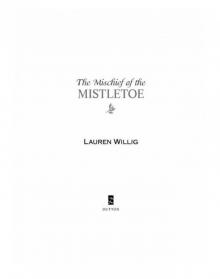 The Mischief of the Mistletoe
The Mischief of the Mistletoe The Mark of the Midnight Manzanilla
The Mark of the Midnight Manzanilla The Other Daughter
The Other Daughter The Ashford Affair
The Ashford Affair The Lure of the Moonflower
The Lure of the Moonflower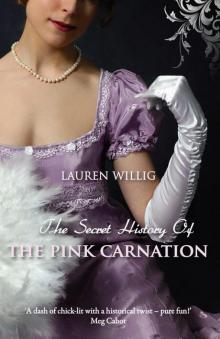 The Secret History of the Pink Carnation
The Secret History of the Pink Carnation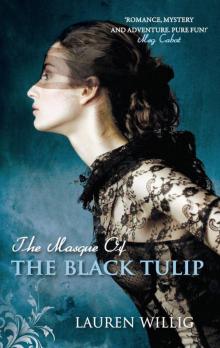 The Masque of the Black Tulip
The Masque of the Black Tulip The Passion of the Purple Plumeria
The Passion of the Purple Plumeria The English Wife
The English Wife The Garden Intrigue
The Garden Intrigue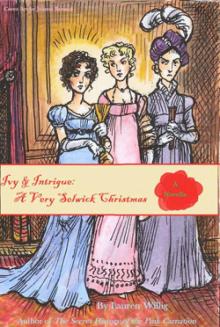 Ivy and Intrigue: A Very Selwick Christmas
Ivy and Intrigue: A Very Selwick Christmas The Orchid Affair
The Orchid Affair The Summer Country
The Summer Country The Betrayal of the Blood Lily
The Betrayal of the Blood Lily The English Wife: A Novel
The English Wife: A Novel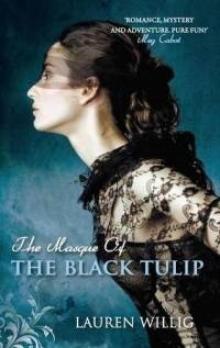 Masque of the Black Tulip pc-2
Masque of the Black Tulip pc-2 The Secret History of the Pink Carnation pc-1
The Secret History of the Pink Carnation pc-1 That Summer: A Novel
That Summer: A Novel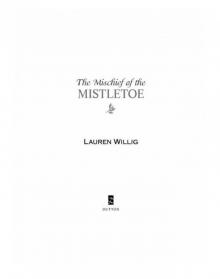 The Mischief of the Mistletoe: A Pink Carnation Christmas
The Mischief of the Mistletoe: A Pink Carnation Christmas